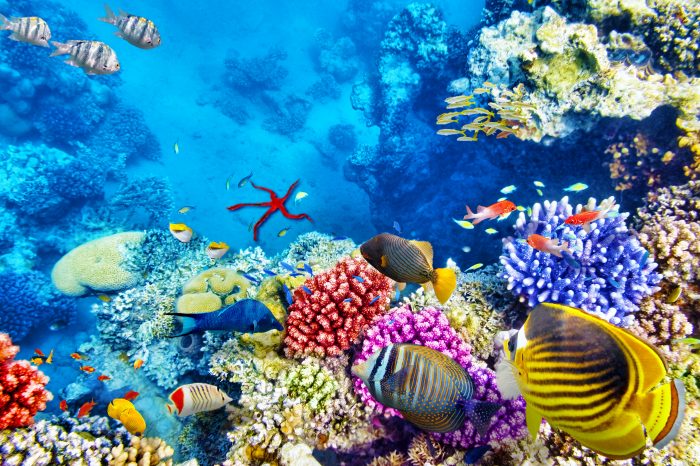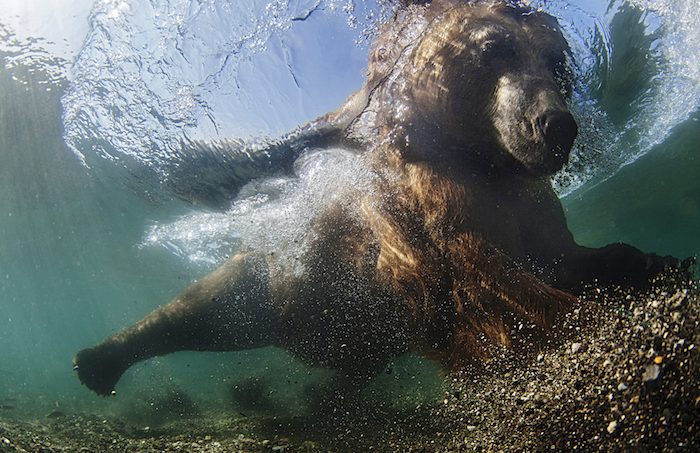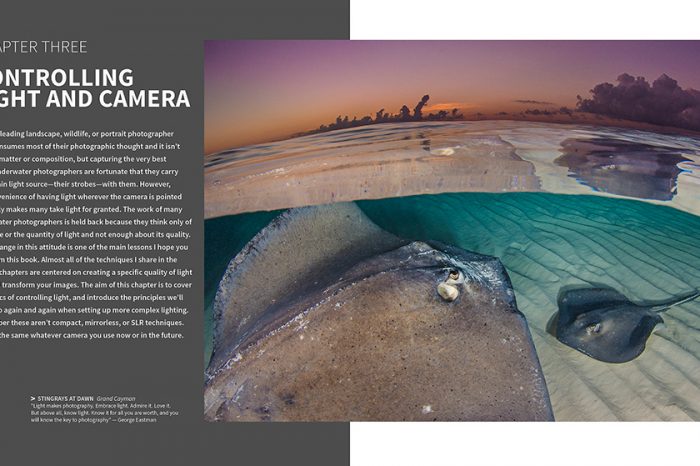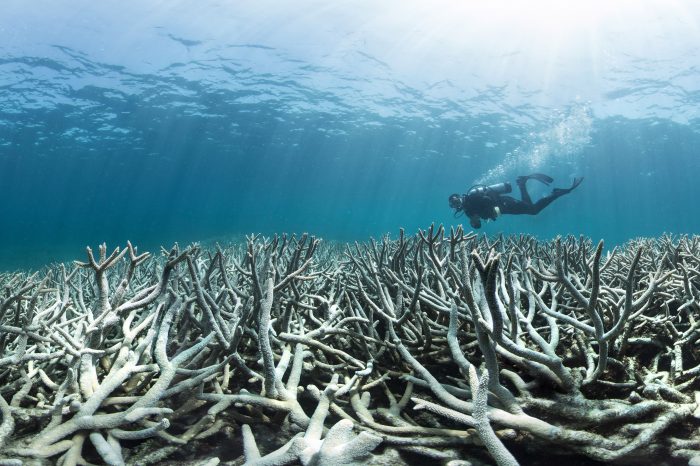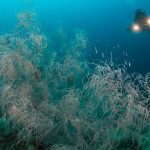Becoming an Underwater Cameraman
Perhaps the greatest ever opening to a documentary series: When the BBC’s Blue Planet revealed footage of the world’s largest mammal. And it began with a blue whale breaching in slo-mo as Attenborough’s voice came in. Its tail up – hanging for a moment – and then fading into the ocean as the mammalian submarine dived.
Scenes such as these are enough to build dreams for aspiring underwater cameramen to actually leap into the ocean and turn a dream into reality. The sights and behaviours that few could ever witness can now mirror onto the television screens of thousands. It’s enough to inspire.
To help those rocked by the motivational waves of underwater documentaries, we speak to Scubazoo’s in-house underwater cameraman Will Foster-Grundy about his journey and work:
How long have you been professionally filming underwater?
I joined underwater production company Scubazoo early last year on an internship, and after a few months spent helping out with anything office based, was given a shot at handling a camera underwater, albeit a GoPro – you’ve got to start somewhere! So I guess you could say I’ve been doing it now for around 15 months. Since that first outing my setup has become a little more elaborate and I now shoot on a Sony EX1R with Gates underwater housing.
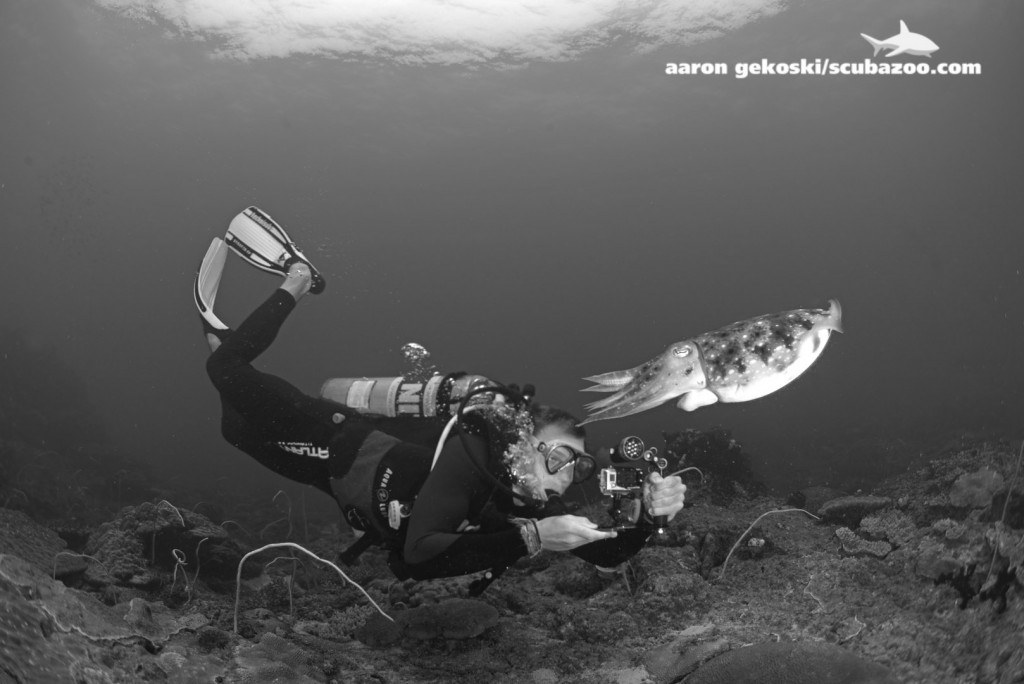
“I’ve always had a real fascination with the natural world. I grew up religiously watching anything with David Attenborough and eventually ended up studying zoology at university.” © Aaron Gekoski
What made you want to become an underwater cameraman?
I’ve always had a real fascination with the natural world. I grew up religiously watching anything with David Attenborough and eventually ended up studying zoology at university. After completing my degree I jetted off to the Caribbean and trained as a PADI divemaster.
I suppose I really wanted to become an underwater cameraman to share the beauty of the ocean with the world and get important marine conservation stories out to the masses through the unparalleled, powerful medium of film. Plus it’s a great excuse to go diving as often as possible!
What initial steps did you take to get into filming?
To take the leap into underwater cinematography, already having a biology background and experience as a divemaster were a pretty good foundation to build from. However, the filming side of things for me was a bit of an unknown. I made every effort to study as much as I could about filmmaking in my spare time and saved up and bought myself a simple camera so I could practise the techniques and skills I was learning about – all above the water for now though.
At the same time I wrote to anyone I could think of to enquire about career advice, work or work experience. Basically anything I could get my hands on – paid or unpaid. After a handful of positive responses – and a lot of rejections – I was eventually given the chance by Scubazoo to come out to Borneo and work as an intern – needless to say, I jumped at it.
To start with, did you face any challenges?
Oh, absolutely. I think like most people I had the idea that this was going to be a dream job from the off, capturing stunning underwater footage, gliding over kaleidoscopic coral reefs, and feeling more like I was on holiday than at work. The reality is rather different. It can be at times an incredibly stressful job which requires meticulous planning and preparation in order for everything to run smoothly.
Without any formal training, I had to learn on the job, which means you progress very quickly but you also make a lot of mistakes in the meantime. It was a real baptism by fire. Thankfully, I was also editing my camerawork so could easily hide all the terrible shots I took…
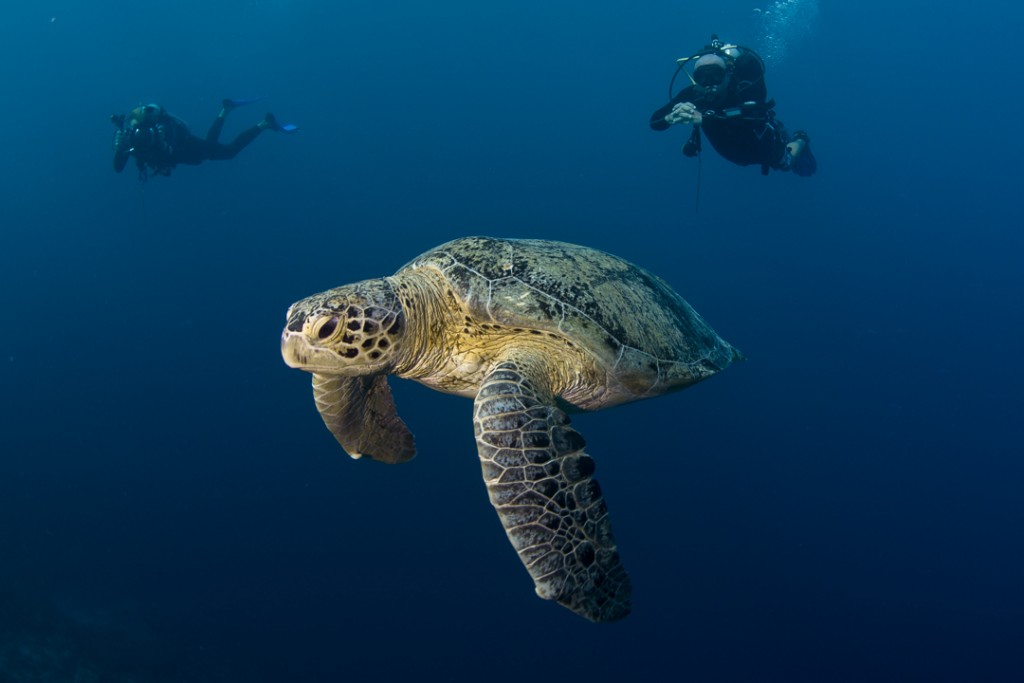
“I made every effort to study as much as I could about filmmaking in my spare time and saved up and bought myself a simple camera so I could practise the techniques and skills I was learning about.” © Aaron Gekoski
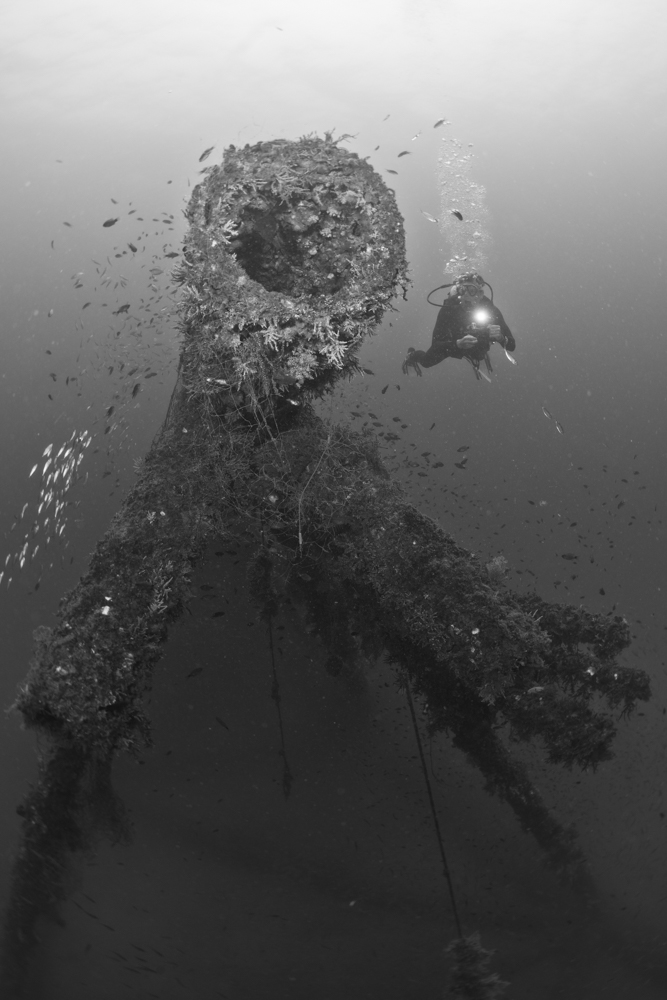
“I had the idea that this was going to be a dream job from the off, capturing stunning underwater footage, gliding over kaleidoscopic coral reefs, and feeling more like I was on holiday than at work. The reality is rather different.” © Aaron Gekoski
Who was your biggest inspiration?
Working at a company like Scubazoo with so many talented and experienced underwater cameramen, it’s not been hard to get inspired. However, I’d have to say that certainly one of my biggest inspirations and mentors has been my colleague and good friend Aaron “Bertie” Gekoski. He really took me under his wing from the first day I went filming underwater and as an underwater photographer and cinematographer himself has taught me a huge amount in the time we’ve worked together.
What is the most important lesson that you have learnt so far?
Planning and preparation are paramount. The more time you put in and allow for before filming, the better you will be on the shoot. It is not worth rushing things as an underwater cameraman – you do not want to flood the camera.
What’s the craziest moment you’ve had when filming?
I was recently lucky enough to spend a week diving at Layang Layang, a small island in the middle of the South China Sea. I was there filming for the second series of a show I’ve been working on called Borneo from Below, which looks at the amazing marine life around the island of Borneo. The plan was to try and catch a glimpse of the migratory population of hammerhead sharks. They are very rare and most sightings are only of individual sharks for a matter of seconds, not ideal for filming. On the fourth day of diving, with no sightings yet, my dive guide and I descended down to 40 metres out in the blue and waited. Just as we were nearing our “no decompression” limits and about to ascend, I suddenly spotted a dark shape about 20–30 metres in front of me. Next thing I knew we were surrounded by a school of at least 60 hammerhead sharks all gracefully swimming in sync. It was one of those genuine goosebump moments, 40 metres deep in the middle of the sea surrounded by a huge school of hammerhead sharks – incredible. Better yet, I got some of my best footage to date.
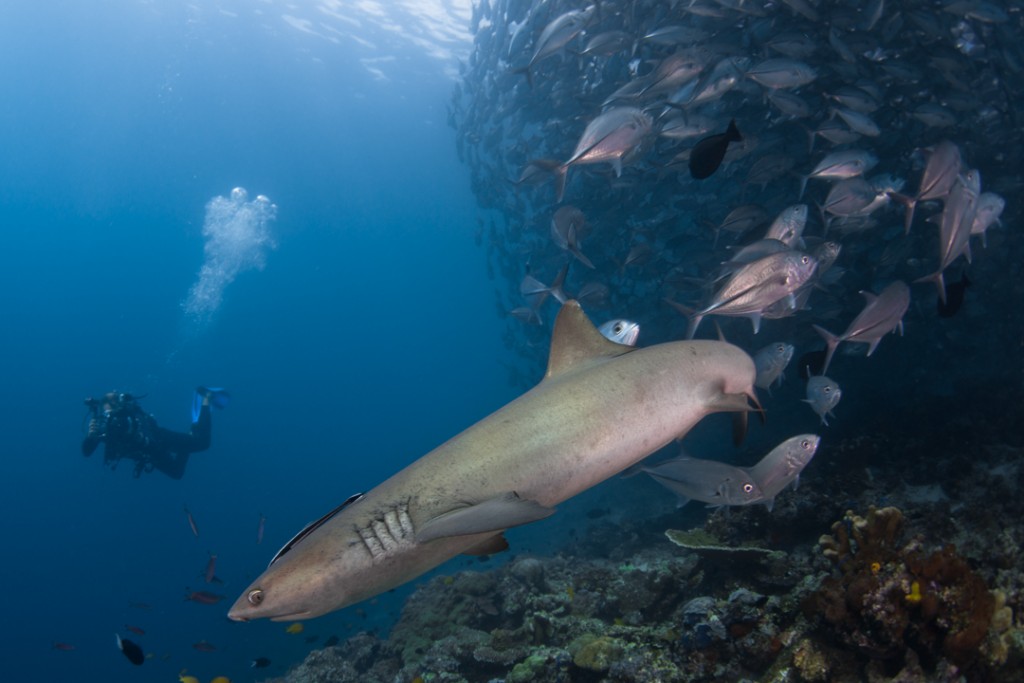
“Planning and preparation are paramount. The more time you put in and allow for before filming, the better you will be on the shoot.” © Aaron Gekoski
What do you think it takes to become a successful underwater cameraman?
You’ve got to be willing to work hard and earn very little money for quite a long time. Other than that, patience, practice and a large helping of luck!
What attributes should an underwater cameraman have?
You’ve got to be very organised, patient, work well under pressure (excuse the pun), be able to read animal behaviour, and have a keen eye for a great shot.
What advice would you give to somebody who is looking to become an underwater cameraman?
Whilst there is definitely no set path to becoming an underwater cameraman, most have a background in biology or other related studies so that’s a good place to begin. Add to that a professional level of diving and then it’s time to beg, borrow and steal any camera and housing you can get your hands on. There’s no substitute for experience so practise, practise, practise, but be warned, whilst learning you may have to work for free for quite a while. But if you can stick it out and show progress then soon enough a paid opportunity will come your way.
What projects are you currently working on?
Funnily enough, right now I’m actually working on a series above the water! I’m directing and shooting an incredibly exciting new show for Scubazoo called Borneo Wildlife Warriors. It follows the great work of the Sabah Wildlife Department’s Wildlife Rescue Unit as they risk life and limb to help to reduce the human-animal conflict found in Borneo and work to ensure the survival of the island’s rich biodiversity. It will be airing in August 2016 on our new platform, SZtv, so don’t miss it! Along with this I’m also filming the second series of Borneo from Below so will be back beneath the waves, camera in hand, soon enough.
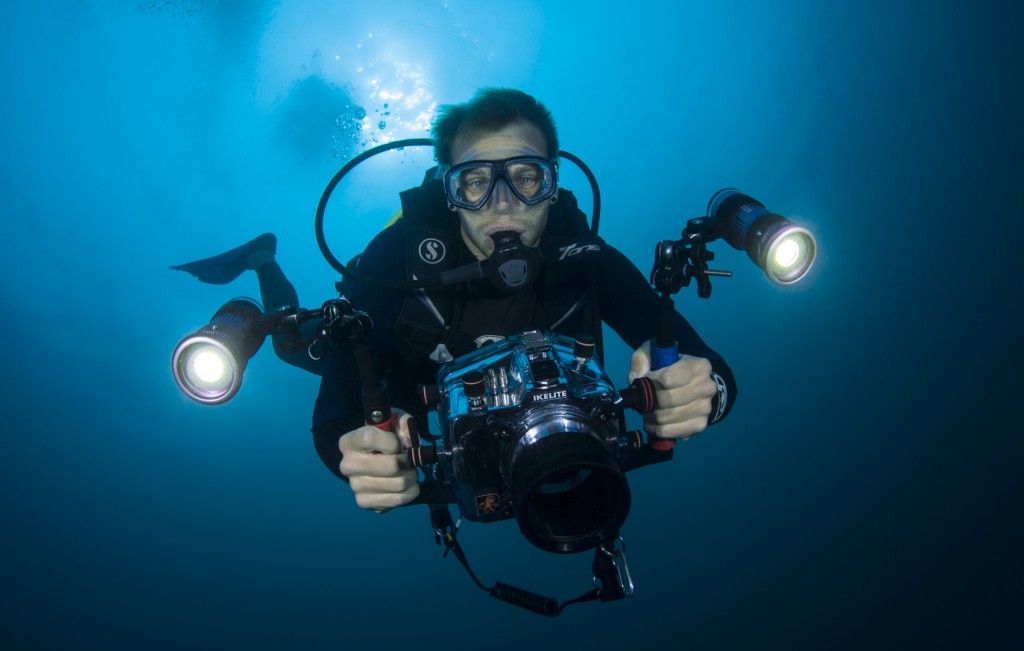
“There’s no substitute for experience so practise, practise, practise, but be warned, whilst learning you may have to work for free for quite a while. But if you can stick it out and show progress then soon enough a paid opportunity will come your way.” © Aaron Gekoski
For more of Scubazoo’s work click here.

